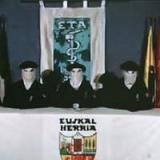A Spanish blog published an interesting comparison of reactions of the then main opposition party (PSOE) to the news that ETA had decided to break the 1999 ceasefire after holding talks with Aznar's PP government, with reactions of the PP, now opposition, to the announcement that ETA was breaking its 2006 ceasefire made public two days ago.
President Zapatero has repeatedly asked the PP opposition to join all other political parties in their support for Government policy towards Basque terrorism and to give their support to the peace process. The following comparisons offer an interesting contrast in reactions of the respective oppositions to the 1999 and 2006 ceasefire break announcements.
Comparison of Opposition Reactions to the end of the ETA Ceasefire both in 1999 and 2007 according to Spanish blog A la Sombra del TomatePSOE Socialist Party - then opposition - reactions to ETA's announcement in 1999:
JOAQUÍN ALMUNIA - Then leader of the PSOE party, then opposition to the PP
29th November in to EFE
"It is clear that the only group responsible for the end of the ceasefire is ETA. We are facing a moment of unity and consensus where those responsible for this are Aznar, Ibarretxe and possibly myself. If the president of the government wants to speak to me I’ll answer his call. All democrats need to put aside our differences and look for what we have in common which is basically the defence of peace and our commitment to work together to achieve peace, democracy and freedom". MANUEL CHAVES - Socialist President of the Andalucian Regional Government and Secretary General of the PSOE party, 30th November
Insisted that his party would
never be guilty of electioneering when it comes to the terrorist problem and that it would back all (PP) Government initiatives in order to
redirect the situation and guarantee the ceasefireCRISTINA CARBONA - then a prominent member of the PSOE party and today Minister of the Environment, 29th November
The attitude of the terrorist organisation can’t be blamed in any circumstances on errors committed by the government or how the government has acted during the peace process in the Basque Country. It is not a moment to appear disunited but to promote the position that all democrats take against this u turn and to trust that ETA will regret its mistake and not return to violence once again.RAMÓN JAÚREGUI, General Secretary of the Basque Socialist Party, 29th November
Pleaded to political parties to "
make it as difficult as possible for ETA to go back to killing", by fostering dialogue between all political groups and insitutions fundamentally between the President of the Government, the Lehendakari (the leader of the Basque Parliament) and the General Secretary of PSOE.
PP - today's main opposition party - reaction to ETA's announcement in 2007MARIANO RAJOY (Leader of the PP), 5th June
“
To give in to a terrorist organization is a mistake that would only serve to strengthen that organization. I ask the Spanish Government to rectify its position. I ask for clarity, certainty, security and under no circumstances that it act ambiguously. The president’s declaration this morning was not clear in any way. I ask that there will be no cession or negotiation with ETA and that he puts into use all the mechanisms of a democratic state and the law. And I ask for facts and proof that all Spaniards require that the government will not give in’’ESPERANZA AGUIRRE (PP President of Madrid), 5th June
"
The President of the government had a mandate to verify that ETA had given up its arms. However, that mandate was never carried out. ETA "has always used ceasefires to rearm itself and that the end of this ceasefire came just two days after it achieved control of some townhalls and 250 million euros towards extorsion and killing".
IGNACIO ASTARLOA, PP Justice and Security Spokesman, 5th June
"
The PP told PSOE that this peace process was ridiculous and would only lead to total concessions to the terrorists and their return but this time stronger. I regret that all this has happened in a scenario of total cession on the part of the government".
LEOPOLDO BARREDA, PP Spokesman in the Basque Country, 5th June
“…Over the last 14 months ther was nothing real or certain about this ceasefire. It gives the impression that everything has been deliberate given that the ceasefire was broken only after the local elections because it was important for them to get back into local government. "
Labels: ETA, Spanish politics

.JPG)


